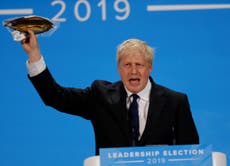A peacetime prime minister has never faced bigger challenges than Boris Johnson
Like Theresa May, he will find his time in No 10 defined by Brexit – but that is far from the only issue facing a Johnson premiership

Without wanting everyone to stay on board the “hamster wheel of doom”, it has to be said that the challenges facing Boris Johnson are as depressing as any facing an incoming British prime minister in peacetime. It may be poetic justice to some that they are, in substantial part, of his own making via his leadership of the Brexit campaign in 2016 but that doesn’t really help us.
Obviously the transcendent issue of his premiership will be the same as the one that wrecked his predecessor’s career – delivering Brexit. So much has been written about this there doesn’t seem to be much to add. As has so often been remarked, the parliamentary arithmetic remains the same, the attitude of the EU remains the same, and the sheer logical force of the Irish backstop retains its terrifying potency. It is, in other words, not a tussle about a used car, where one side or other can offer another £200 on the trade-in to get the deal done. Rather, it is as if one side is arguing that 2+2=4, and the other insists that 2+2=5, because there are technical ways of making it so, but that anyway they’ll settle for 4.5. It’s really about that fundamental tenet of Johnsonism – having your cake and eating it. And what you do when you discover it is impossible, and that no amount of “positive energy” can make it happen. Make a joke, obviously, and call the French turds – but then what?
So Brexit will, once again, start to collapse under the weight of its own contradictions.
Still, Boris is creating some new Brexit-related problems. First, he is threatening no-deal. This is something that, the signs still are, parliament will find a way to rule out. In her “No deal is better than a bad deal” phase Theresa May tried that one, but the loss of the snap election and a reassertive Commons killed no deal. It is enjoying a brief resurrection – but it will be killed off again.
Second, related to that, he is threatening to prorogue, or suspend parliament. That is a proposition, common sense suggests, that the apolitical Queen and the palace will be reluctant to agree to, in the circumstances. Again, one way or another, the House of Commons or the courts or the Speaker may restrain him.
Third – not an especially new idea – Boris could go for a fresh election, and gamble on winning a freakish Tor majority in our weird four-party system. Still, he seems too fond of being Her Majesty’s first minister to want to chuck it all away within weeks of winning the prize. If nothing else, he couldn’t cope with the humiliation, having nowhere to live again, and the loss of sex appeal that goes with the job (“Power is the ultimate aphrodisiac,” as Henry Kissinger once said, which must make Boris at least marginally fanciable).
So the chances are that Brexit will drag, or be settled on May’s terms, or go to a second referendum, which Boris will this time leave to others to fight and agree graciously to whatever the great British people – the ones on the hamster wheel of doom – decide to do.
Then, maybe we can see what kind of a premier he is going to be. In the absence of a fully costed Boris “manifesto” with thought-through policy commitments (I foolishly imagined there’d be one) all we have to go on are the scraps from his rare TV appearances and various leaks to the newspapers.
We may as well take him at his word, and his personal pitch at the ITV Debate laid out his priorities as follows: more money for our schools; more police on the beat; full fibre broadband for all.
He made the case that “to have fantastic infrastructure and public services you must have a dynamic, market economy”.
If it was anything, it was a version of Thatcherism, but perhaps without the same regard for the public finances and it is these, and the weak economy that underlies them, that will be by far the biggest obstacle to Boris Johnson achieving his objectives, and, with them, winning an election and a mandate in his own right from the voters.
One of the many ironies swirling around now is that the best thing that could happen to the Johnson administration is for Brexit to be cancelled, by public demand. Then, and only then, will the cloud of lower growth be lifted, the fiscal headroom engineered by Philip Hammond become freely available, and the cash become available for Johnson and his chancellor (Sajid Javid?) to regenerate the economy and buy some votes. Altogether the Institute for Fiscal Studies says that Johnson’s plans will cost approaching £30bn a year, they could easily be more, as they are so often vague, informal or spun.
Still, in a Remain scenario it would also be easier for Johnson to fulfil the pledges on tax cuts he has variously made during his leadership campaign. So that means taking people on more than £50,000 out of the top rate of tax and national insurance while simultaneously raising tax thresholds for the lowest paid. It would be the biggest series of tax cuts since the 1980s, and firmly aimed at marginal voters. It would be followed up by pay rises in the public sector (amounts unspecified) and, perhaps, more funding for the social care crisis. HS2 would probably survive the Johnson review. How much public money will be “spaffed” on faster broadband or, say, an underground railway for Greater Leeds (an early Johnson idea floated in the hustings) remains to be seen.
At the moment, borrowing to invest might well be an option for a Johnson government, and don’t forget that Javid, in his leadership campaign, promised a massive £100bn public infrastructure programme to fix the north-south divide, presumably funded by the Exchequer. It would all help raise the UK’s sluggish productivity growth – the real problem – and guarantee higher livings standards. It is not such a barmy idea, if done right and with the right schemes (there is little point in building “roads to nowhere”). By actually being even bolder than John McDonnell, but without the redistributive edge to Labour’s approach, a Johnson-Javid partnership might have some chance of repairing the Conservatives’ devalued reputation for economic competence and making people better off.
But if Johnson actually believes in and is in a position to deliver the no-deal Brexit he insists is a possibility, if only a “million-to-one” chance, then things will be very different. Then we will see not a kinder, gentler pragmatic One Nation Conservatism with pay hikes for nurses and tax cuts for head teachers; but instead one that makes the hard times of high Thatcherism in the 1980s and George Osborne’s austerity programme of 2011 look like a jolly, bibulous Johnson family dinner party.
In that scenario, we enter the world where the UK economy enters recession, the economy takes a 15-year hit of £90bn, firms go bust, investment freezes up and the pound crashes. It would mean higher interest rates to contain higher inflation, and mass unemployment appearing simultaneously with a skills and labour shortage in parts of the economy deprived of EU labour. It will be a mess. Then the only currency Johnson will have is optimism, and the only realistic strategy he and his ministers can follow is to build the “Singapore on Thames” the Brexiteers have occasionally and wistfully talked about. This great enterprising Global Britain will mean not only the usual sort of cuts to the public sector, but a major retrenchment. Areas of the welfare state and NHS will have to be abandoned to charities, and the benefits system will be starved of resources. Nothing will escape the axe, nothing will be sacred. We will be told that there is no alternative, as ever, and that the higher growth that will eventually arrive will be worth all the sacrifices. In that context, the climate emergency, Theresa May’s “burning injustices” and the refugee crisis can “go whistle”, to borrow a Boris phrase.
The only trouble with all that is that the British public are not ready for it. Certainly not so in Scotland and Northern Ireland – which voted to Remain in 2016. Making himself “Minister for the Union”, as Johnson has floated, will not make it any easier to keep the “awesome foursome” of the UK’s nations stick together through such traumas. Johnson might well resist calls for referendums – but for how long? An Old Etonian running an English government for the benefit of rich Tories in the southeast? Not a good look.
The most honest and straightforward thing a Boris Johnson government could do is to put that no-deal plan and that choice about what kind of a future the peoples of the UK and it nations want to a public vote – Leave or Remain.
Some of his in-tray will be a lot easier than Brexit. Depending on the moods and whims of Donald Trump, repairing Anglo-American relations should be easy – until Trump decides he doesn’t like Boris after all. It is difficult to judge what Johnson’s instincts will be on China, over Hong King, and Russia, over aggression and cyber interference, and Saudi Arabia, over their own aggression and freedom. On the one side, he seems to want to play the patriot standing up for Britain; on the other, the cynical old statesman who puts arms sales and trade deals ahead of human rights In the end, much will depend on the economic fundamentals. If the UK is weak and outside the EU, he might take a stronger line. Outside the EU, and desperate for investment and exports, he would be more inclined to appease.
The one thing that Johnson can determine, the one thing that is within his own ambit, is how he runs his government. It is just possible that this may be one advantage he has. He gets bored easily, is impatient of detail and loves to surround himself with a “gang” he knows and trust implicitly, as he did when mayor of London. After swearing each member of his new cabinet to no-deal Brexit (if needs be) and personal loyalty, he might, just might, let them all get on with their jobs, be creative, follow their own dreams, while he enjoys the trappings of power, chatting up Trump, Xi, Putin, and MBS, and sticking to the fun bits of the job. He will no doubt relish the challenge of working that famous Boris charm on Nicola Sturgeon, Arlene Foster, Michelle O’Neill and Ursula von der Leyen over dinner and leisurely games of tennis at Chequers. It might work.
If not, then we will soon find himself trapped on the hamster wheel of doom. In which case BoJo will soon lose his mojo. And his BoJob.






Join our commenting forum
Join thought-provoking conversations, follow other Independent readers and see their replies